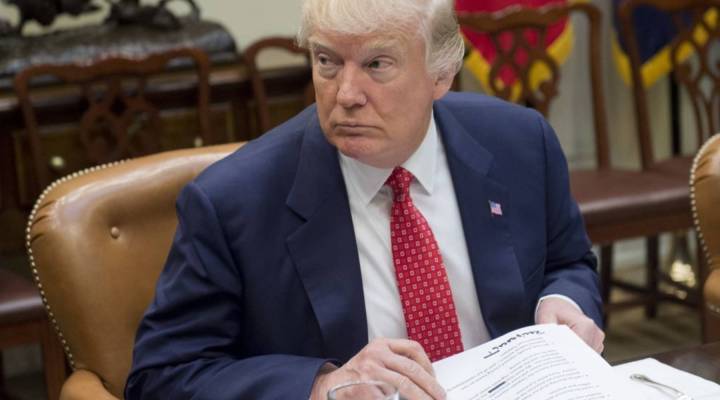
Trump to call for slashes to the federal workforce

President Donald Trump is officially ending the freeze on federal hiring — with a caveat.
His budget director, Mick Mulvaney, sent a memo to federal agencies this morning instructing them to develop plans that minimize employment with “surgical” cuts to staff. Trump is asking these agencies to issue plans to the White House by June 30, said Emily Goodin, the managing editor of RealClearPolitics.
Mulvaney wouldn’t give specific details or figures on job cuts, but said efficiency is the name of the game. David Reich, senior fellow at the Center on Budget and Policy Priorities, said Trump’s efficiency rhetoric is about more than streamlining the government.
“While this document uses the language of improving management and so forth, throughout it also runs the theme of we’re planning to implement our budget proposals,” he said.
“This kind of comes at a delicate time,” Goodin said, “because right now Congress and the president are re-negotiating a budget agreement.”
Congress appropriates money to these agencies, and Democrats especially won’t be happy that cuts are coming, she said.
This isn’t the first time a new president has called for government efficiency. The Obama administration sent proposals to Congress in 2012 and 2015, and those suggested consolidating some departments. There were also hiring freezes under Presidents Reagan and Carter.
Kent Smetters at the Wharton School said there’s a problem with simply relying on job cuts to lighten a budget.
“The bottom line is that it’s going to have a trivially small impact on the budget,” he said.
Goodin said that when previous administrations tried similar overhauls, the number of government contractors ended up increasing as the number of federal workers got slashed.
“It’s kind of this inverse relationship and government contractors usually make more money than federal employees,” Goodin said. “So I’m not sure how much of a win-win that is.”
There’s a lot happening in the world. Through it all, Marketplace is here for you.
You rely on Marketplace to break down the world’s events and tell you how it affects you in a fact-based, approachable way. We rely on your financial support to keep making that possible.
Your donation today powers the independent journalism that you rely on. For just $5/month, you can help sustain Marketplace so we can keep reporting on the things that matter to you.












